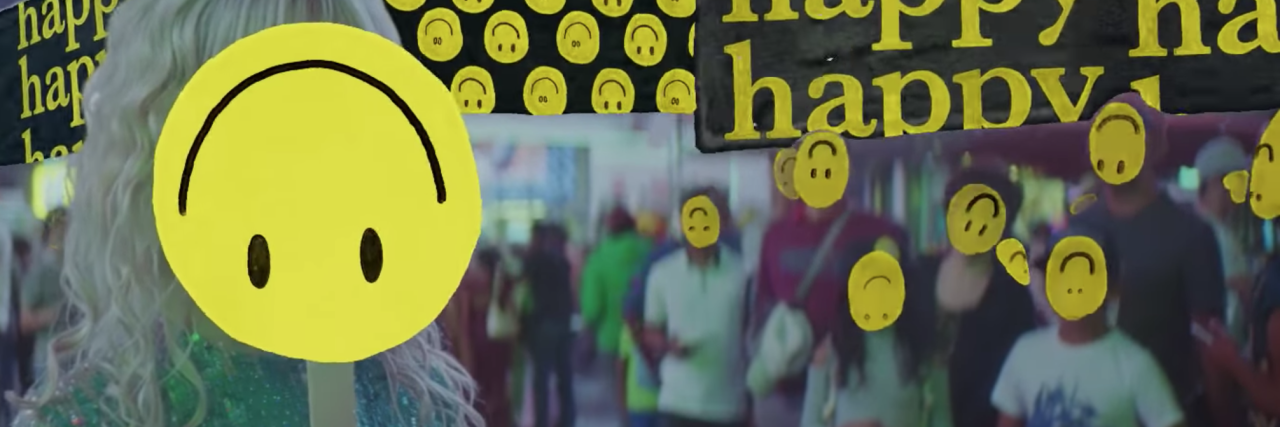Paramore has given us some great music in the past. As I really sat and listened to their newest single “Fake Happy” from their album “After Laughter,” I was overwhelmed by this feeling that the song had been written with me in mind. It had to have been! It perfectly described something that has been a huge part of my life — the façade that can only be described as “fake happy.” As someone with bipolar disorder and anxiety, I can relate to Paramore’s song.
• What is Bipolar disorder?
The song starts slow as Hayley laments her need to make people believe, “What you get is what you see,” acknowledging the sham that is her “fake” happiness. Then the song changes into this upbeat pop song you could dance to if you felt so inclined. She starts to play pretend and can make it through her day. I can absolutely understand the feeling of needing to pretend to be happy. It’s a coping mechanism that can be exhausting and impossible to keep up.
There is a danger in pretending everything is alright when inside you feel like you’re dying. It just seems like the best way to convince everyone you’re OK. It becomes second nature. You throw on a smile when you see friends in the hall, and it fades immediately as you walk away. We hide our pain to protect us and those around us, but in reality, we are hurting ourselves.
I never realized how difficult is was to fool the people around me into believing I was this extroverted, type A personality until I physically and mentally couldn’t fake it anymore. Slowly but surely, people began to wonder why I was missing school, or not responding to any of their attempts to contact me. I had worked so hard to be a leader at my community college and had just transferred to a major university at the age of 29. I thought to myself: if teenagers can handle it, then so can I! I had been coping with my illnesses without medication for 12 years. I didn’t see it then, but my unrelenting perfectionism mixed with my untreated mental illnesses were a recipe for disaster.
I wasn’t always successful. I dropped out of high school shortly after I was diagnosed with bipolar disorder and anxiety. I was devastated. I felt like such a failure, and it would be years before I earned my GED and started community college. I never stopped being bipolar, but I had gained a coping mechanism I considered a necessary, survival skill. I had just married my husband and with his help, and my ability to fake happy, I was able to enroll in college.
I was extremely successful in college, with my high GPA and strong leadership roles on campus. I also began to mentor fellow students, and encourage them to stay in college. I am an empath by nature, so mentoring was a joy for me, but I began to feel exhausted. When I got to my university, everything fell apart. I immediately hit the ground running by doing well in my classes and joining organizations on campus. I was even picked to run tutoring sessions for my Genetics course. I accomplished these things by pretending everything was OK the entire time.
From the second I woke up for class, I had to force the fake happiness to envelop me and carry me through the day. It worked for a while, but then I hit a depressive episode. It became nearly impossible to fake my way through my day, and I was too tired to keep up with my work and responsibilities. I started missing classes, and quit my tutoring position. I started to fail some classes, and then it happened. My ability to cope was gone, and I felt alone.
What saved me was my loving husband, friends and family. My support network recognized I needed help even when I thought they couldn’t really see me. I found a psychiatrist and together we are working to ensure I don’t have to cope anymore. It’s a process for sure, but with medications and therapy, I hope to be back on top very soon.
Paramore’s Hayley Williams openly discussed her battle with depression recently, and I was pleased that she did. By sharing her story, she reminded us that success and mental illness are not mutually exclusive. Then, when you hear a song like “Fake Happy,” you can, of course, relate along with the added sense of knowing things can get better. We need to learn to let go of our favorite coping mechanism and ask for help when we need it the most. We must give up on “Fake Happy,” and strive for the real thing.

